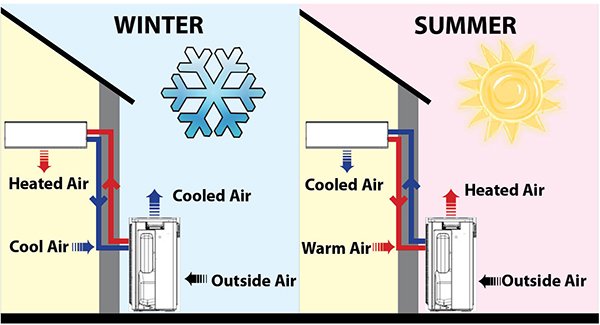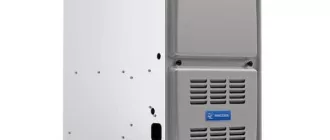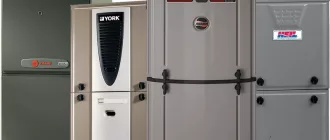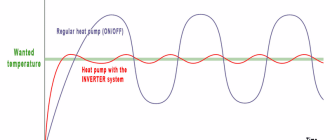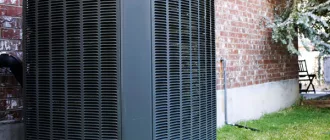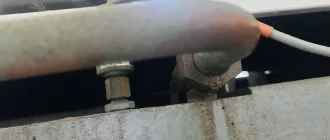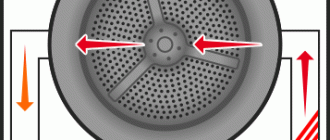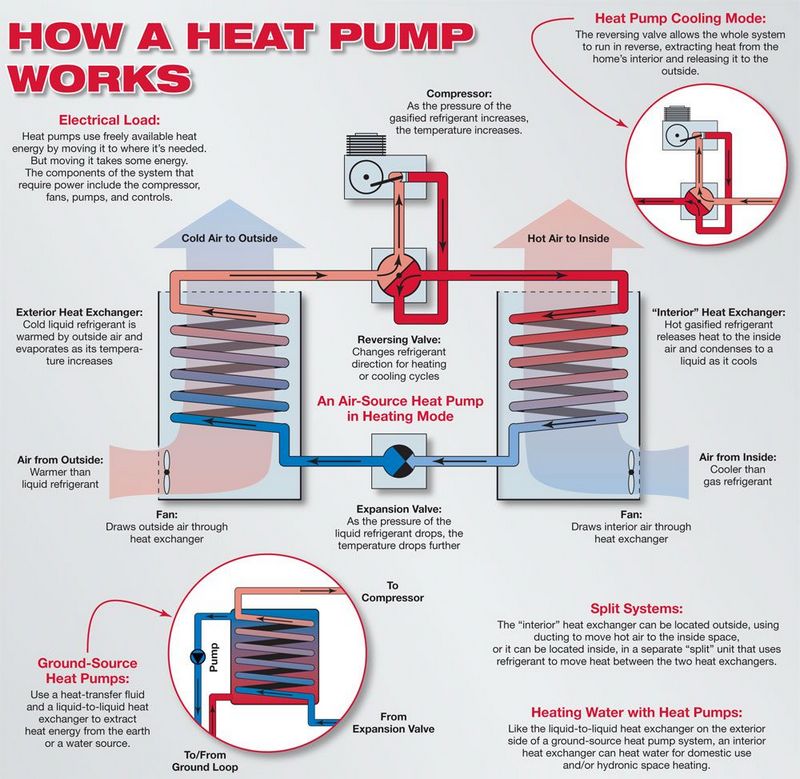
Is Your Heat Pump Operating at Max Effectiveness
Are you experiencing a decrease in heat effectiveness from your pump? Don’t worry – we have some tips to help improve its efficiency!
1. Regular Maintenance: Proper maintenance of your heat pump is essential for optimal functionality. Schedule regular check-ups and cleanings to remove any debris or dirt that may be affecting its performance.
2. Air Filter Replacement: A clogged or dirty air filter can restrict airflow and reduce the effectiveness of your heat pump. Make sure to replace it regularly to ensure maximum efficiency.
3. Thermostat Settings: Adjusting your thermostat settings can greatly impact the efficiency of your heat pump. Consider lowering the temperature when you’re away or using a programmable thermostat to optimize energy usage.
4. Insulation: Poor insulation can lead to heat loss and decreased effectiveness of your heat pump. Ensure that your home is properly insulated to prevent any heat leakage.
5. Clear the Area Around the Pump: Make sure there are no obstructions or debris blocking the airflow around your heat pump. Clear any vegetation or debris that may be hindering its performance.
6. Professional Inspection: If you’re still experiencing issues with your heat pump’s effectiveness, it’s best to consult a professional. They can identify any underlying problems and provide the necessary solutions.
Don’t let a decrease in heat pump effectiveness leave you in the cold. By following these tips, you can improve its efficiency and ensure maximum heat output in your home.
Remember, a well-maintained and efficient heat pump not only keeps you warm but also helps save on energy costs. Take action today to maximize the effectiveness of your heat pump!
Maximize Your Heat Pump Efficiency with These Tips
When it comes to optimizing the performance of your heat pump, there are several steps you can take to maximize its efficiency. By following these tips, you can ensure that your heat pump is operating at its full potential, keeping your living or working space comfortable and energy costs low.
- Clean and Replace Air Filters Regularly: Dirty air filters can restrict airflow and reduce the effectiveness of your heat pump. Make sure to clean or replace them every 1-3 months to maintain optimum performance.
- Keep the Outdoor Unit Clean: Debris, leaves, and dirt can accumulate on the outdoor unit of your heat pump, hindering its efficiency. Regularly remove any obstructions and keep the area clean to ensure proper airflow.
- Program the Thermostat: Utilize a programmable thermostat to set temperature schedules that accommodate your daily routine. By adjusting the temperature when you’re away or asleep, you can reduce energy consumption and increase efficiency.
- Seal and Insulate Ducts: Leaky ducts can cause air leaks, reducing the efficiency of your heat pump system. Ensure that all ducts are properly sealed and insulated to prevent air loss and maintain maximum effectiveness.
- Maintain Annual Inspections: Regular maintenance from a professional technician is crucial for the longevity and efficiency of your heat pump. Schedule annual inspections to identify and address any issues before they become major problems.
By implementing these tips, you can maximize the efficiency of your heat pump and ensure that it operates at its peak effectiveness. Not only will this save you money on energy costs, but it will also provide a comfortable environment all year round.
Regular Maintenance
Regular maintenance is crucial to ensuring the effectiveness and maximum efficiency of your heat pump. By following these tips, you can keep your heat pump running smoothly and reduce the risk of costly repairs.
1. Clean or replace filters regularly: Dirty filters can obstruct the airflow, making your heat pump work harder and less efficiently. Clean or replace your filters every month or as recommended by the manufacturer.
2. Clear debris from the outdoor unit: Leaves, grass, and other debris can accumulate around the outdoor unit, hindering the airflow. Regularly clean the area around the unit to maintain proper airflow.
3. Schedule professional maintenance: Regular maintenance by a certified technician is essential to keep your heat pump in top condition. A professional can identify and fix any issues before they become major problems.
4. Check the thermostat settings: Ensure that your thermostat is set to the appropriate temperature for each season. Avoid extreme temperature settings that can strain your heat pump and reduce its efficiency.
5. Inspect electrical connections: Loose or corroded electrical connections can affect the performance of your heat pump. Regularly check and tighten any loose connections to ensure proper operation.
6. Clean the coil and fan blades: Over time, dirt and debris can build up on the coil and fan blades, reducing the heat pump’s efficiency. Clean these components regularly to maintain optimal performance.
By following these regular maintenance tips, you can maximize the effectiveness and efficiency of your heat pump, ensuring a comfortable and cost-effective heating and cooling experience.
Clean and Replace Air Filters
One of the most important steps you can take to ensure that your heat pump is operating at maximum effectiveness is to regularly clean and replace the air filters. Air filters are a crucial component of a heat pump as they help to keep the air flowing smoothly and efficiently.
Over time, air filters can become clogged with dust, dirt, and other contaminants. This can restrict airflow and cause your heat pump to work harder, reducing its efficiency. By regularly cleaning and replacing the air filters, you can ensure that your heat pump is operating at its best.
To clean the air filters, you can gently remove them from the heat pump and use a vacuum cleaner or a soft brush to remove any dust or debris. If the filters are too dirty or damaged, it is recommended to replace them with new ones. It is generally recommended to clean or replace the air filters every 1-3 months, depending on the level of usage and air quality.
| 1. Improved Heat Pump Efficiency: By removing dirt and debris, clean air filters allow for better airflow, helping your heat pump work more effectively. |
| 2. Energy Savings: A clogged air filter can cause your heat pump to use more energy to maintain the desired temperature. Keeping the filters clean can help reduce energy consumption. |
| 3. Extended Lifespan: Regular maintenance, including cleaning and replacing air filters, can help prolong the lifespan of your heat pump by preventing unnecessary strain on the system. |
Regularly cleaning and replacing the air filters of your heat pump is a simple yet effective way to ensure its efficiency and long-term performance. Don’t underestimate the importance of this maintenance task to keep your heat pump operating at its best.
Keep the Surrounding Area Clear
One of the most important factors in maintaining the effectiveness of your heat pump is to keep the surrounding area clear. A heat pump operates by drawing in air from the surrounding environment and using it to heat or cool your home. If the area around your heat pump is obstructed or cluttered, it can hinder the performance of the pump and reduce its efficiency.
To ensure that your heat pump is operating at its maximum effectiveness, it is important to create a clear space around it. This means removing any debris, leaves, or other objects that may have accumulated near the pump. Additionally, you should avoid stacking or storing items on or around the pump, as this can restrict air circulation and prevent proper functioning.
By keeping the surrounding area clear, you allow for proper airflow and ventilation, which is essential for the heat pump to operate efficiently. This will help to improve the overall effectiveness of the pump and ensure that it is able to maintain a comfortable and consistent temperature in your home.
In addition to keeping the area clear, it is also important to regularly clean and maintain your heat pump. This includes removing any dirt or debris that may have accumulated on the exterior of the pump and scheduling routine maintenance checks to ensure that all components are functioning properly.
| – Improved airflow and ventilation |
| – Optimal performance and efficiency of the heat pump |
| – Longer lifespan of the heat pump |
| – Consistent and comfortable temperature in your home |
Check and Clean the Coils
A heat pump relies on the efficiency of its coils to effectively transfer heat. Over time, these coils can become dirty and clogged, leading to decreased performance and energy efficiency.
To ensure your heat pump is operating at maximum effectiveness, it is important to regularly check and clean the coils. Here are some tips to help you maintain the efficiency of your heat pump:
1. Inspect the Coils
Start by visually inspecting the coils for any visible dirt, debris, or buildup. A layer of dust or dirt on the coils can hinder the heat transfer process and reduce the efficiency of your heat pump.
2. Clean the Coils
Remove any loose debris or dirt from the coils using a soft brush or a vacuum cleaner with a brush attachment. Ensure that the power to the heat pump is turned off before cleaning to prevent any accidents.
3. Use Foaming Coil Cleaner
For more stubborn dirt and grime, consider using a foaming coil cleaner. Apply the cleaner as directed by the manufacturer and allow it to sit for the specified amount of time. Then, rinse off the coils thoroughly with water.
4. Schedule Professional Maintenance
In addition to regular cleaning, it is recommended to schedule professional maintenance for your heat pump at least once a year. A trained technician can thoroughly clean and inspect the coils, as well as check other components to ensure optimal performance.
By regularly checking and cleaning the coils of your heat pump, you can improve its effectiveness and maximize its energy efficiency. This will not only help you save on heating costs but also extend the lifespan of your heat pump.
Maintain Proper Airflow
Proper airflow is essential for your heat pump to operate at maximum effectiveness and efficiency. Without proper airflow, the heat pump may struggle to distribute heat or cool air effectively throughout your home, resulting in wasted energy and increased utility bills. Here are some tips to maintain proper airflow:
- Clean or replace air filters regularly: Dirty or clogged air filters can restrict airflow, making it harder for your heat pump to function efficiently. It’s recommended to clean or replace your air filters every 1-3 months, or as advised by the manufacturer.
- Clear obstructions around the outdoor unit: Ensure that there are no objects, debris, or vegetation blocking the airflow around your heat pump’s outdoor unit. Good clearance helps to prevent airflow restriction and maximize the performance of your heat pump.
- Check and clean the indoor and outdoor coils: Over time, dirt, dust, and debris can accumulate on the coils, reducing their effectiveness and impeding airflow. Regularly inspect the coils and clean them as needed to ensure optimal airflow and efficient heat exchange.
- Keep vents and registers unobstructed: Make sure that furniture, curtains, or other objects do not block the vents and registers throughout your home. Obstructed vents can restrict airflow, making it harder for your heat pump to heat or cool your space effectively.
- Consider using ceiling fans: Ceiling fans can help improve airflow and circulation in your home, enhancing the performance of your heat pump. During the warmer months, set the fan to rotate counterclockwise to create a cooling breeze. In colder months, set the fan to rotate clockwise at a low speed to push warm air down from the ceiling.
By following these tips to maintain proper airflow, you can ensure that your heat pump operates at its maximum effectiveness, providing you with optimal comfort while minimizing energy consumption and utility costs.
Use a Programmable Thermostat
One of the key factors in maximizing the effectiveness of your heat pump is using a programmable thermostat. A programmable thermostat allows you to set different temperatures for different times of the day, maximizing energy efficiency while still keeping your home comfortable.
By programming your thermostat to lower the temperature when no one is home or during times when you’re sleeping, you can reduce the workload on your heat pump and save on energy costs. With a programmable thermostat, you can ensure that your heat pump is operating at its maximum efficiency whenever it’s needed, without wasting energy when it’s not.
In addition to saving you money on energy bills, a programmable thermostat also provides convenience and comfort. You can set the temperature to automatically adjust before you wake up or return home, so your living space is always at the perfect temperature when you need it.
Installing a programmable thermostat is a relatively simple process that can have a significant impact on your heat pump’s performance. Consult your heat pump’s manual or contact a professional for guidance on installing and programming a thermostat compatible with your system.
Overall, utilizing a programmable thermostat is an effective way to ensure that your heat pump is operating at maximum efficiency, reducing energy consumption, and maintaining a comfortable environment in your home.
Improve Insulation
One of the key factors that can significantly enhance the efficiency of your heat pump is improving insulation in your home. Proper insulation helps to minimize heat loss in the winter and heat gain in the summer, allowing your heat pump to operate at its maximum effectiveness.
To ensure optimal insulation, start by checking for any draughts or gaps around doors, windows, and other openings. Seal these areas using weatherstripping or caulking to prevent unwanted air leakage.
Additionally, consider adding insulation to your walls, floors, and attic. This can be done by installing insulation batts, rolls, or blown-in insulation materials. A well-insulated home retains heat more effectively, reducing the workload on your heat pump and improving its efficiency.
Furthermore, enhancing insulation in your home can also help to reduce noise transmission from outside. Insulated walls, floors, and ceilings act as effective sound barriers, providing a quieter and more comfortable living environment.
By taking steps to improve insulation in your home, you can ensure that your heat pump operates at its maximum effectiveness, saving energy and money while maintaining a comfortable indoor temperature.
Seal Air Leaks
In order for your heat pump to operate at maximum efficiency, it is crucial to seal any air leaks in your home. Air leaks can greatly reduce the effectiveness of your heat pump, causing it to work harder and use more energy than necessary.
Here are some tips to help you seal air leaks:
| 1 | Check windows and doors for gaps or cracks. Use weatherstripping or caulk to seal any visible leaks. |
| 2 | Inspect your attic and basement for any openings or holes. Use spray foam insulation or sealant to fill in these gaps. |
| 3 | Don’t forget about electrical outlets and switches. Install foam gaskets or use caulk to seal around these areas. |
| 4 | Check your ductwork for any leaks. Use foil tape or mastic sealant to repair any damaged or loose connections. |
| 5 | Consider using window film or insulated curtains to help minimize heat transfer through your windows. |
By taking the time to seal air leaks in your home, you can greatly improve the efficiency of your heat pump. This will not only help you save money on your energy bills, but also extend the lifespan of your heat pump.
Consider Heat Pump Sizing
One important factor to consider when maximizing the efficiency of your heat pump is its size. Ensuring that your heat pump is appropriately sized for your heating and cooling needs is crucial in operating it at its maximum effectiveness.
If the heat pump is too small for your space, it will struggle to heat or cool the area efficiently. On the other hand, if the heat pump is too large, it may cycle on and off frequently, resulting in energy wastage and reduced overall performance.
To determine the proper size of heat pump for your home, you should take into account factors such as the square footage of the area you want to heat or cool, the insulation levels of your home, and the climate in which you live. Consulting with a professional HVAC technician is recommended to accurately assess your heat pump sizing needs.
| Benefits of Proper Heat Pump Sizing: |
| 1. Maximize energy efficiency: With the right-sized heat pump, you can ensure that it operates at its maximum efficiency, saving you money on energy bills. |
| 2. Optimal comfort levels: A properly sized heat pump will be able to maintain consistent and comfortable temperatures throughout your home. |
| 3. Longer lifespan: When a heat pump is not overworked due to improper sizing, it can last longer and require fewer repairs. |
In conclusion, considering heat pump sizing is essential in order to maximize its effectiveness. By ensuring that your heat pump is properly sized, you can enjoy the benefits of improved energy efficiency, optimal comfort, and a longer lifespan for your heat pump.
Use Ceiling Fans
One way to improve the effectiveness of your heat pump and ensure it is operating at maximum efficiency is by using ceiling fans. Ceiling fans can help distribute cool air in the summer and warm air in the winter, making your heat pump’s job easier.
During the summer months, you can set your ceiling fans to rotate counterclockwise. This will create a cool breeze that can make the room feel much cooler. By using ceiling fans, you can rely less on your heat pump for cooling, reducing its workload and improving its overall efficiency.
During the winter months, you can set your ceiling fans to rotate clockwise at a low speed. This will help push warm air down from the ceiling, improving the circulation of heat in the room. By redistributing warm air, your heat pump won’t need to work as hard, resulting in energy savings and increased effectiveness.
Remember to adjust the direction and speed of your ceiling fans based on the season and your comfort needs. Using ceiling fans in conjunction with your heat pump can help create a comfortable environment while maximizing its efficiency.
| 1. Improved air circulation and distribution |
| 2. Reduced workload on the heat pump |
| 3. Energy savings |
| 4. Increased effectiveness of the heat pump |
Utilize Zone Heating
One effective way to maximize the operating efficiency and effectiveness of your heat pump is to utilize zone heating. Zone heating allows you to control the temperature in different areas or zones of your home independently.
By dividing your home into zones, you can avoid wasting energy by only heating the areas that are being used. This can lead to significant energy savings and ensure that your heat pump is operating at its maximum efficiency.
Here are some tips for effectively utilizing zone heating:
- Install programmable thermostats in each zone to allow for customized temperature settings.
- Close the vents in unoccupied zones to redirect the airflow to the areas that need heating.
- Use space heaters or electric blankets in specific zones to provide additional warmth without having to increase the temperature throughout the entire house.
- Regularly monitor and adjust the temperature settings in each zone to ensure optimal comfort and energy efficiency.
- Consider installing a zoning system that allows for individual control of each zone and can automatically adjust the temperature based on occupancy and usage patterns.
By utilizing zone heating, you can improve the effectiveness and efficiency of your heat pump, leading to cost savings and increased comfort in your home.
Schedule Regular Professional Inspections
Regular professional inspections are essential to ensure that your heat pump is operating at its maximum effectiveness. By scheduling regular inspections, you can identify any potential issues early on and address them before they become major problems.
During these inspections, trained professionals will thoroughly inspect your heat pump, checking for any signs of wear and tear, leaks, or inefficiencies. They will also clean and lubricate the various components to ensure optimal performance.
By investing in regular professional inspections, you can improve the overall efficiency of your heat pump. This will not only help reduce your energy costs but also extend the lifespan of your equipment. Additionally, a well-maintained heat pump will provide you with consistent and comfortable heating or cooling throughout the year.
Don’t wait until your pump starts operating at less than max effectiveness. Schedule regular professional inspections today to keep your heat pump running at its best.
Upgrade to a More Efficient Heat Pump
If you find that your heat pump is not operating at its maximum effectiveness, it might be time to consider upgrading to a more efficient model. A more efficient heat pump can provide you with numerous benefits, including improved heating and cooling performance, reduced energy costs, and a smaller carbon footprint.
When it comes to heat pumps, efficiency is key. Upgrading to a more efficient heat pump can significantly enhance the effectiveness of your heating and cooling system. With advancements in technology and energy-saving features, newer models offer improved performance and greater energy efficiency compared to older ones.
By investing in a more efficient heat pump, you can enjoy enhanced comfort throughout the year while saving money on your energy bills. These modern heat pumps are designed to provide optimum performance regardless of the weather conditions, ensuring a consistently comfortable indoor environment.
Not only will upgrading to a more efficient heat pump benefit your wallet, but it will also benefit the environment. By reducing energy consumption, you can reduce your carbon footprint and contribute to a more sustainable future. Switching to a more efficient heat pump is a simple and effective way to make a positive impact on the planet.
Additionally, many newer heat pump models come with advanced features such as programmable thermostats, smart controls, and variable speed motors, which further enhance their efficiency and performance. These features allow you to customize your heating and cooling settings, ensuring maximum comfort while minimizing energy usage.
In conclusion, upgrading to a more efficient heat pump is a wise investment that can improve the effectiveness of your heating and cooling system. With improved performance, reduced energy costs, and environmental benefits, it’s a win-win situation for both your comfort and the planet. Don’t wait any longer – make the switch to a more efficient heat pump today!
Q&A:
How can I improve the efficiency of my heat pump?
There are several ways to improve the efficiency of your heat pump. First, make sure you have regular maintenance performed on your unit to keep it running smoothly. Additionally, you can improve efficiency by properly insulating your home and sealing any air leaks. Finally, consider using a programmable thermostat to optimize temperature settings.
Why is my heat pump not operating at maximum effectiveness?
There could be several reasons why your heat pump is not operating at maximum effectiveness. It could be due to a lack of maintenance, dirty filters, or refrigerant leaks. It is best to have a professional inspect and diagnose the issue to ensure proper functioning of your heat pump.
How often should I have maintenance performed on my heat pump?
It is generally recommended to have maintenance performed on your heat pump at least once a year. This will help keep the unit operating efficiently and can prevent potential issues from arising.
What are the benefits of properly insulating my home?
Properly insulating your home can provide several benefits. It helps to maintain a consistent temperature in your living spaces, reducing the workload on your heat pump. This can result in energy savings and improved efficiency. It also helps to minimize drafts and increase overall comfort.
Can using a programmable thermostat really improve the efficiency of my heat pump?
Yes, using a programmable thermostat can greatly improve the efficiency of your heat pump. By setting specific temperature schedules, you can avoid unnecessary energy usage and ensure that your heat pump is only operating when needed. This can lead to cost savings and a more efficient heating and cooling system.
How can I improve the efficiency of my heat pump?
There are several ways you can improve the efficiency of your heat pump. First, make sure you have regular maintenance performed on your system to keep it running smoothly. You should also make sure your heat pump is properly sized for your home, as an oversized or undersized unit can result in decreased efficiency. Additionally, you can improve efficiency by properly insulating your home and sealing any air leaks. Finally, consider setting your thermostat to a slightly lower temperature to reduce the workload on your heat pump.
What is the importance of regular maintenance for a heat pump?
Regular maintenance is crucial for ensuring the efficiency and longevity of your heat pump. During a maintenance visit, a professional technician will inspect and clean the various components of your heat pump, including the filters, coils, and fan. They will also check the refrigerant levels and make any necessary adjustments. By keeping your heat pump well-maintained, you can prevent potential issues, such as reduced efficiency or breakdowns, and extend the lifespan of your system.

